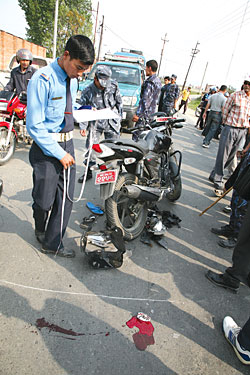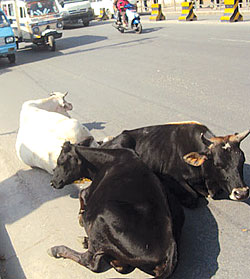 MIN RATNA BAJRACHARYA |
Rabindra Magar was driving his school bus at Rani Pokhari corner at rush hour recently when a speeding motorcycle, trying to overtake, sideswiped his vehicle from the right. The biker fell off and went somersaulting into the sidewalk.
As is the custom, a crowd immediately gathered around. Pedestrians and onlookers who were strangers to the motorcycle driver were ready to lynch Rabindra, but he was saved by arrival of the traffic police. "They would have burnt the bus if it was not carrying school children, so I was also spared," Rabindra recalls.
Traffic accidents are a spectator sport. There is a reversal of the might is right principle at work here. If a bicycle hits a motorcycle, the motorcycle pays. If a motorcycle hits a car, the car driver pays for damages even if it was no fault of his own. If a truck hits a car, and the car suffers greater damage, the car owner has to pay for the minor damage to the truck.
In Rabindra's case, the school was forced to admit the motorcycle driver to hospital, cover his medical expenses and repair his bike. The cost: Rs 250,000 for medical and garage bills. "There is nowhere to go to complain," says Umet Shrestha, the school principal.
The rule of the thumb is that if a pedestrian is hit, it is always the fault of the motorised vehicle. If a bicycle hits a motorcycle, it is the fault of the motorised vehicle. The vehicle whose owner is deemed to be more capable of paying for damages is always at fault.
We put this to Valley Traffic Chief Bigyan Raj Sharma, who admits it has been the practice that large vehicle are often held responsible. "There is no such rule, but we always try to investigate who is at fault," he says. "Our priority is that the injured should get immediate medical attention."
Traffic accidents have become the excuse for extortion by locals, and neighbourhood toughies often get into the act to shakedown the vehicle owner in return of a cut of the payoff.
Rajan Khadka owns a fleet of taxis, one of which hit a middle-aged woman in Swayambhu recently. The driver took her to Teaching Hospital and drove his car to the police station and left it there. The relatives of the woman, who suffered a fractured leg, first demanded that she be treated in a private hospital. Khadka took her to B & B, where recovery was slow because she was diabetic. Then her relatives demanded she be flown to Delhi for treatment. By the end of the ordeal, Khadka had spent nearly Rs 400,000.
The Vehicles and Transportation Management Act provides for compensation of Rs 500,000 and Rs 25,000 for funeral expenses if someone is killed in a traffic accident. But the cost of treating the injured has no limit because of extortion. Says Khadka: "It is cheaper if the accident victim dies. An accident isn't deliberate, and the injured is not always right."
Since there are no CCTV cameras to monitor traffic, police have to rely on witness accounts. Sharma admits that onlookers tend to have a soft corner for the injured. A solution would be mandatory third party insurance for vehicle owners.
"Accidents aren't deliberate, and it is usually one side that is negligent but the tendency is that no one readily owns up his mistake," says Sudarshan Lamichhane, district attorney of Lalitpur district. "The court asks for evidence and sometimes it might be against the victim."
Nepal's political transition has bred an atmosphere of lawlessness and impunity, where a mob rather than the rule of law metes out instant justice after a traffic accident. Usually it is the side that is seen to be more able to pay that has to pay.
Last year, there were 8,500 traffic accidents all over the country, double the number of accident compared to previous year, in which 200 people were killed and 6,000 injured. The number killed the previous year was 148.
Says Sharma, "The traffic law applies equally to all, be it pedestrian, cyclist, motorbike or lorry at least until I am in charge." He should tell that to people like to Rabindra Magar, Rajan Khadka and Umet Shrestha.
 RSS |
HOLY COW
If a car kills a pedestrian in a traffic accident, the Vehicles and Transportation Management Act (VTMA 1993) provides for a compensation of Rs 500,000 to the next of kin and funeral expenses of Rs 25,000. However, if the pedestrian is severely injured, the expenses to the vehicle owner can exceed Rs 1 million depending on the seriousness of the injury and time spent in hospital. In the absence of third party insurance, the vehicle owner ends up paying this.
But, wait for this. If a car hits a cow on the street, the punishment is a fine of Rs 500,000 or life imprisonment or both, says Kathmandu SP Jagat Man Shrestha. However, Shrestha says police don't usually pursue the case. Compensation for the owner of the cow is also Rs 500,000, according to the VTMA.


